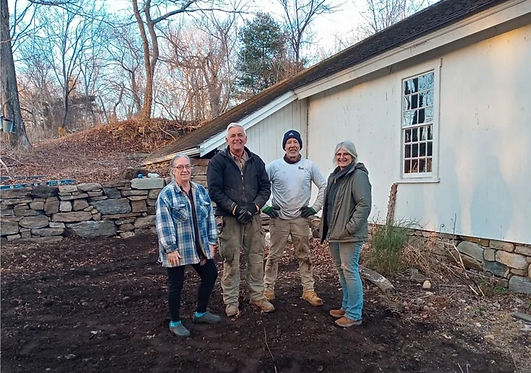
North Stonington was once the thriving center of textile manufacturing, known for its ability to create a wide variety of dye colors made from plants: our sought-after plaid fabrics featured colors made from indigo leaves and madder roots. The North Stonington Historical Society is fortunate to own one of our town's original dye houses, once owned by Horace Babcock. In honor of Historical Society doyen Anna Coit's 100th birthday, funds were raised to restore this important building and it was renamed in her honor.


The original Dye Garden (left) was conceived by Laurie Pepin in 2009, to feature dye plants labeled according to the qualities and color they would offer in the natural dying process. It was redesigned and expanded into the shape of a spinning wheel: each space between the spokes contains plants that create a distinct dye color - reds, yellows, oranges, purples or blues.
Vilma Gregoropoulos was tasked with making the grounds more closely reflect the early 19th century period of the Homestead so she brought in local mason, Ken Geer, to rebuild the Dye House stone wall, add steps to the lavender bed, and build a couple of stone benches.

The bed was dug and graded by Gary Anino.
A water saving planting method called Hugelkultur was installed by Kevin Desabrais, using woody debris to retain water beneath the bed.
Kevin Desabrais then installed the brick spinning wheel that separates the garden into dye colors.
Shan Haley Rice organized volunteers and donations, successfully keeping us on track to get the garden open for the 2023 season.





Jonathan Edwards donated rain barrels that will be used to collect water from the Dye House roof and water the garden, and local dyers Ellen Stone and Lori Dziedzic donated dye plants. In September of 2023 we were able to reopen Dye House Day, led by Dye House Chair Gladys Chase!

